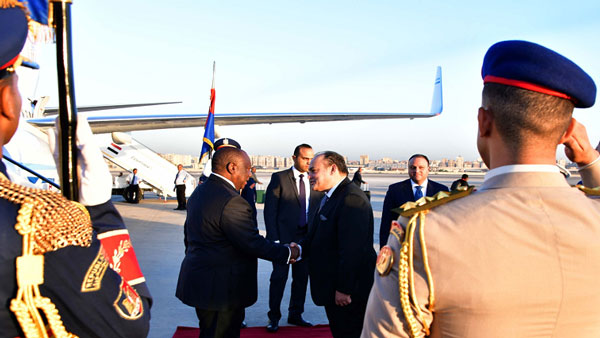
CAIRO | Xinhua | Despite the multiple economic challenges it faced in 2023, Egypt continued to play an active peacemaking role in maintaining security and stability in the Middle East.
Surrounded by crises and conflicts in its neighboring countries and regions, including Libya, Sudan and the Gaza Strip, Egypt acted as a major mediator in a bid to secure a safe environment on its borders.
PEACEMAKING EFFORTS FOR NEIGHBORS
In January, Egypt hosted extensive meetings on the Libyan crisis participated by senior Libyan officials, including one attended by Speaker of the Libyan House of Representatives Aguila Saleh and then Chairman of the High Council of State Khalid al-Mishri, who agreed to develop a clear “roadmap” to hold the Libyan elections.
“Egypt’s interests and national security do not lie only within its internal borders, but they extend to be influenced by the situations in Sudan, Libya and Yemen,” said Maged Botros, a political science professor at the Cairo-based Helwan University.
The lack of security in Libya previously led to an increase in weapons smuggling and terrorist attacks in Egypt, Botros explained.
With regard to the conflict in Sudan between the Sudanese Armed Forces and the paramilitary Rapid Support Forces, Cairo hosted in July a summit attended by Sudan’s neighboring countries, including Eritrea, South Sudan, the Central African Republic, Libya, Ethiopia and Chad, which succeeded in unifying their stance on the Sudanese crisis.
The leaders agreed to form a mechanism at the level of foreign ministers to develop practical and implementable solutions to stop the fighting in Sudan and reach a comprehensive solution to the issue.
Sudan’s stability will have an impact on Egypt’s national security, Botros said, adding Sudan will also directly affect Egypt’s water security, as the two neighbors are both the downstream countries of the Nile River.
MEDIATING GAZA CONFLICT
Egypt, a traditional mediator in the Israel-Palestine conflict, did the same in trying to end the bloody conflict that erupted between Israel and Hamas on Oct. 7, when Hamas militants launched a surprise attack on southern Israel that prompted Israel’s relentless military retaliation in the Gaza Strip.
Egypt hosted in October the Cairo Summit for Peace over the deadly conflict in Gaza, gathering leaders and representatives of over 30 countries, in addition to the United Nations, African Union, and Arab League.
Afterward, Egypt, working together with Qatar and the U.S., succeeded in reaching a temporary seven-day truce between Israel and Hamas from Nov. 24 to 30. Around 240 Palestinian prisoners were released by Israel in exchange for the freedom of 81 Israelis and 24 people of other nationalities who were detained by Hamas.
The Rafah border crossing between Egypt and Gaza has also been the only lifeline to provide the war-torn enclave with relief supplies amid the ongoing Israeli siege and bombardment.
The year 2023 also witnessed the resumption of Egypt’s diplomatic relations with both Türkiye and Syria after years of rift.
“Egypt played a pivotal role in avoiding the escalation of conflicts and promoting peace in the region,” Botros told Xinhua.
FIGHTING ECONOMIC HARDSHIPS
In the meantime, the North African country is facing multiple economic challenges, including a shortage of hard currency, growing external debt, and high inflation.
“Egypt experienced great difficulties throughout 2023 to secure the foreign currency needed for its development,” said Egyptian economist Waleed Gaballah, a member of the Egyptian Society of Political Economy, Statistics and Legislation.
Gaballah explained that the U.S. dollar shortage in Egypt led the inflation to reach record levels, in addition to a sharp fluctuation in the country’s economic indicators.
The Egyptian pound has lost more than half of its value since March 2022, while its foreign debt exceeded 165 billion dollars at the end of March 2023, according to official statistics.
However, Gaballah stressed that “Egypt succeeded, through its regional role, in maintaining its national security despite the difficult economic challenges and the increasing scope of conflicts in the regional environment.”
This month, the country concluded its presidential election with a 66.8-percent turnout, according to the National Election Authority. Abdel-Fattah al-Sisi, Egypt’s incumbent president, won the presidential election with 89.6 percent of the vote, securing a third term in office.
Some voters who supported Sisi said they voted for him for the sake of peace, stability and security of their country, hoping that the economy and living conditions will further improve. ■
 The Independent Uganda: You get the Truth we Pay the Price
The Independent Uganda: You get the Truth we Pay the Price





